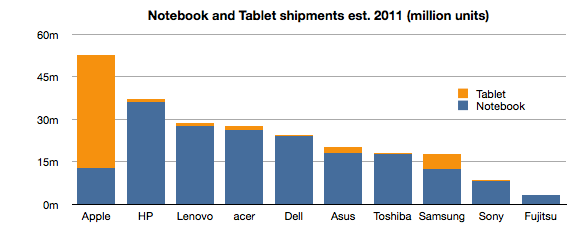The iPad is still only slightly more than a year and a half old. Forecasting unit volumes has proven very difficult. But more than that it’s proven very difficult to appreciate the impact on the market it’s disrupting, PCs.
For some people this is obvious, but what if you don’t live and breathe disruptive theory? What if you don’t watch every data source like a hawk for hints of change? What if you are not even a technologist. How would you form an opinion on the effect of the iPad on PCs?
There are many industries and sectors about which I know nothing. If you asked me to analyze a market like industrial lubricants, I’d probably start by reading the consensus opinion put forward by the leading market analyst, an expert in that particular sector. That would form the baseline.
In the PC sector, that opinion is formed by Gartner (and IDC and Forrester perhaps). Gartner will get a lot of citations and its stats and opinion forms the baseline view. It may not be right, but we can expect it to be the “consensus”. This is because Gartner surveys a lot of data and interacts with a lot of insiders in the industry. They collect and weigh these inputs and put out what is likely to balance them all.
If Gartner says that the iPad is a “media tablet” that is not a PC they may be wrong. But they are also repeating what the PC industry is saying. So I value Gartner as a reflection of the consensus. If there is a significant gap between Gartner and what I conclude to be reality then there is an interesting opportunity as well as evidence of incumbent ignorance.
Let’s then look back on how Gartner has been reporting the iPad’s rise and the PC’s decline.[1]
Q2 2010
“The consumer PC market registered double-digit shipment growth, but consumer mobile shipment growth slowed. This was due in part to slower growth of mini-notebooks,” Ms. Kitagawa said. “Surging popularity of Apple’s iPad temporarily cannibalized mini-notebooks, as well as consumer notebook sales to some degree. It is not certain at this stage if the cannibalization will continue with the current price point of media tablets.”
Q3 2010
“Media tablet hype around devices such as the iPad has also affected consumer notebook growth by delaying some PC purchases, especially in the U.S. consumer market. Media tablets don’t replace primary PCs, but they affect PC purchases in many ways,” Ms. Kitagawa said. “At this stage, hype around media tablets has led consumers and the channels to take a ‘wait and see’ approach to buying a new device.”
Q4 2010
“U.S. holiday sales were not fantastic for most PC vendors, but the professional market did show healthy growth during the quarter,” Ms. Kitagawa said. “Media tablets undoubtedly intensified the competition in the consumer market. These devices do not replace primary PCs, but they are viewed as good enough devices for these who want to have a second and third connected device for content consumption usage. Mini-notebook shipments were hit the most by the success of media tablets.”
Q1 2011
“Weak demand for consumer PCs was the biggest inhibitor of growth,” said Mikako Kitagawa, principal analyst at Gartner. “Low prices for consumer PCs, which had long stimulated growth, no longer attracted buyers. Instead, consumers turned their attention to media tablets and other consumer electronics. With the launch of the iPad 2 in February, more consumers either switched to buying an alternative device, or simply held back from buying PCs. We’re investigating whether this trend is likely to have a long-term effect on the PC market.”
Q2 2011
Overall shipments of media tablets took place late this quarter and volumes remained low, minimizing any impact of the media tablets for PC substitutions in the second quarter of 2011
Q3 2011
“The main contributor to the weak consumer PC market in the U.S. was intensified competition for consumers’ money,” Kitagawa said “Media tablets and smartphones took center stage in the U.S. retail sector, and the expectation is for continuing demand for these devices throughout the holiday season.”
I’ve added emphasis for the key words describing the impact of the iPad (referred to as “media tablets”).
Note how the message changed over time. At first the effect was thought to be temporary (presumably due to “hype”). Three months later the “hype” was leading to “hesitation” in the channel. Three more months and there was “a hit” on Mini-notebooks but only for those needing a second or third device for “consumption”. In the fourth report it seems that “consumers” (vs. business users) are really interested in this. The fifth report suggests that the effect is “minimal”. The latest report suggests that this is a “localized effect”.
An external observer (or paying customer) reading this must conclude that five quarters in, these media tablets are having some effect but most probably a transient one. By keeping tablets separate from PC’s Gartner is implicitly stating that the two products do not compete. If they have an effect it’s on the discretionary spending by consumers. Similar to the effect game consoles or consumer electronics may be having on PCs.
However, if tablets were added to notebook totals the chart for 2011 would look like this:[2]
Notes:
- The quotes are from periodic reports (every quarter) from the same analyst at the same firm using a consistent set of measurements about the market. In order to ensure the same context, I’ve selected the comments from press releases published using the same template.
- Source: Digitimes Research, compiled by Digitimes, October 2011
Discover more from Asymco
Subscribe to get the latest posts sent to your email.

